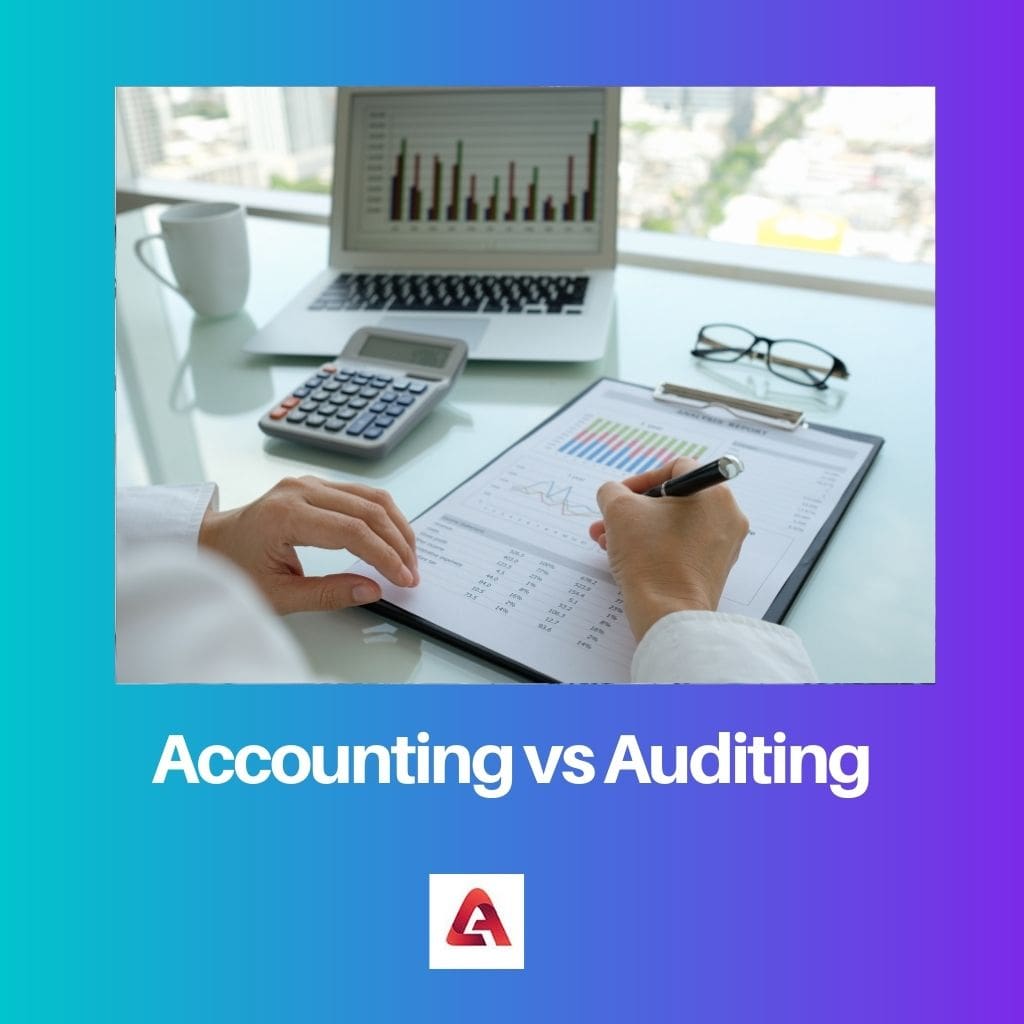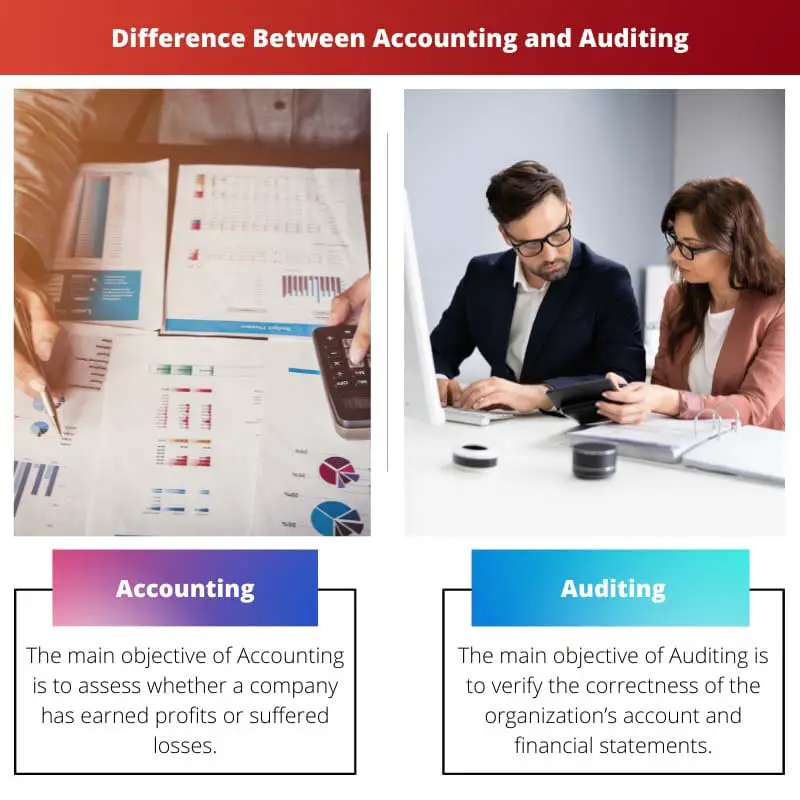Accounting involves the systematic recording, analysis, and reporting of financial transactions and information to provide an accurate and comprehensive view of an organization’s financial health. Auditing, on the other hand, is the independent examination and verification of an organization’s financial statements, records, and internal controls by certified auditors to ensure their accuracy, compliance with accounting standards, and reliability for stakeholders.
Key Takeaways
- Accounting involves recording, classifying, and reporting financial transactions to provide accurate financial statements for a business.
- Auditing is examining and verifying financial records to ensure the information’s accuracy, compliance, and reliability.
- While accounting focuses on creating financial statements, auditing evaluates the accuracy and integrity of those statements and internal controls.
Accounting vs Auditing
Accounting focuses on current financial transactions (all records), while auditing focuses on past financial statements (final records). Accounting is done by an accountant, while auditing is carried out by an auditor. Accounting is a continuous process, whereas Auditing is a periodic process.

Accounting refers to the process of keeping the updated records for every financial transaction i.e. sale or purchase of any item and preparing the requisite financial statements.
Whereas Auditing is the process where financial statements prepared under the accounting process are used to analyzed & assessed to verify whether they are correct or not.
Also, steps are taken in Auditing to reach an opinion on whether these financial statements are prepared according to the reporting and legal framework which is specifically defined for preparations & presentations of financial statements.
Comparison Table
| Feature | Accounting | Auditing |
|---|---|---|
| Purpose | Record and track financial transactions | Verify the accuracy and completeness of financial records |
| Process | Daily, ongoing activity | Periodic (annually) |
| Focus | Historical data | Past and present data |
| Output | Financial statements (balance sheet, income statement, cash flow statement) | Auditor’s opinion on the fairness of the financial statements |
| Skills | Bookkeeping, record-keeping, data entry, financial analysis | Analytical thinking, critical thinking, problem-solving, communication, professional skepticism |
| Certifications | Certified Public Accountant (CPA) not required but beneficial | Certified Public Accountant (CPA) required |
| Career paths | Staff accountant, senior accountant, controller, CFO | Auditor, audit manager, audit partner, internal auditor |
| Regulation | Generally Accepted Accounting Principles (GAAP) | Generally Accepted Auditing Standards (GAAS) |
| Impact on financial statements | Prepares the financial statements | Provides an opinion on the fairness of the financial statements |
| Impact on business operations | Provides information to help managers make informed decisions | Provides assurance to stakeholders about the accuracy and completeness of the financial statements |
What is Accounting?
Accounting is a systematic process of recording, summarizing, analyzing, and reporting financial transactions and information of an organization or individual. It plays a crucial role in helping businesses and individuals track their financial activities, make informed decisions, and meet legal and regulatory requirements. Here are some key aspects of accounting:
- Recording Transactions: Accountants document financial transactions, such as sales, purchases, payments, and receipts, in a structured and organized manner. This involves the use of accounting software, spreadsheets, or manual ledgers.
- Summarizing Financial Data: The recorded transactions are then summarized into financial statements, including the balance sheet, income statement (profit and loss statement), and cash flow statement. These statements provide a snapshot of an entity’s financial health and performance.
- Analyzing Financial Information: Accountants analyze financial data to assess the financial stability and performance of an organization. This analysis helps make informed decisions, identify trends, and plan for the future.
- Financial Reporting: Accountants prepare and present financial reports to various stakeholders, such as investors, creditors, management, and government authorities. These reports must adhere to accepted accounting principles (GAAP) or international financial reporting standards (IFRS) to ensure accuracy and transparency.
- Budgeting and Forecasting: Accountants participate in the budgeting and forecasting process by helping organizations set financial goals, create budgets, and monitor actual performance against these budgets.
- Tax Compliance: Accountants help individuals and businesses comply with tax laws and regulations by preparing and filing tax returns. They also provide tax planning advice to minimize tax liabilities legally.
- Auditing: Some accountants work as auditors, examining an organization’s financial records and processes to ensure accuracy and compliance with accounting standards and regulations.
- Management Accounting: Management accountants focus on providing internal financial information to aid managerial decision-making. They may create cost analysis reports, variance analysis, and other reports that assist in optimizing business operations.
- Forensic Accounting: Forensic accountants investigate financial irregularities, such as fraud or embezzlement, and provide expert testimony in legal proceedings.

What is Auditing?
Auditing is a systematic and independent examination of an organization’s financial statements, accounting records, internal controls, and financial processes to assess their accuracy, completeness, and compliance with applicable accounting standards, laws, and regulations. The primary objective of an audit is to provide assurance to stakeholders, such as shareholders, investors, creditors, and the public, regarding the reliability of the financial information presented by the audited entity.
Here are some key aspects of auditing:
- Independence: Auditors must maintain independence from the audited organization to ensure objectivity and impartiality. They should not have any financial or personal interests that could compromise their ability to provide an unbiased opinion.
- Assurance: The ultimate goal of an audit is to provide reasonable assurance that the financial statements are free from material misstatements and are presented fairly by the applicable accounting standards. This assurance enhances the credibility of the financial information.
- Scope: Auditors determine the scope of the audit, which includes selecting specific accounts, transactions, and processes to examine. They use various audit procedures, such as testing transactions, examining documentation, and verifying balances.
- Materiality: Auditors assess materiality to determine the significance of errors or misstatements in the financial statements. Material misstatements could influence the decisions of users of the financial statements.
- Internal Controls: Auditors evaluate the internal control systems of the audited organization. Strong internal controls help prevent errors and fraud and ensure the reliability of financial reporting. Auditors may make recommendations for improving internal controls if deficiencies are identified.
- Compliance: Auditors also assess whether the audited organization complies with relevant laws, regulations, and accounting standards. This includes evaluating tax compliance, regulatory compliance, and adherence to accounting principles.
- Audit Opinion: After the audit, auditors provide an audit opinion, which is a formal statement regarding the fairness of the financial statements. The types of audit opinions include unqualified (clean), qualified (with exceptions), adverse (significant issues), or disclaimer (unable to form an opinion).
- Reporting: Auditors issue an audit report that contains their findings, conclusions, and the audit opinion. This report is included in the organization’s annual report or financial statements.

Main Differences Between Accounting and Auditing
- Purpose:
- Accounting: The primary purpose of accounting is to record, summarize, analyze, and report financial transactions and information for the internal and external stakeholders of an organization. It involves the day-to-day financial management of an entity and the preparation of financial statements.
- Auditing: The primary purpose of auditing is to independently examine and evaluate an organization’s financial statements, accounting records, and internal controls to provide assurance of their accuracy and compliance with accounting standards and regulations. External or internal auditors perform auditing to verify the reliability of financial information.
- Role:
- Accounting: Accountants are responsible for managing and maintaining an organization’s financial records, preparing financial statements, budgets, and financial reports, and providing financial information to support decision-making.
- Auditing: Auditors are responsible for reviewing and examining an organization’s financial records, transactions, and processes to assess its financial statements’ accuracy and reliability. They provide an independent opinion on the fairness of the financial statements but do not play a direct role in financial management.
- Timing:
- Accounting: Accounting is an ongoing process that occurs throughout the year. Accountants are involved in day-to-day financial activities and financial reporting at regular intervals, such as monthly, quarterly, and annually.
- Auditing: Auditing is conducted periodically, once a year for the annual financial statements. However, internal audits may occur more frequently to assess internal controls and compliance.
- Reporting:
- Accounting: Accountants produce financial statements and reports for internal and external use. These reports are generated regularly to provide management and stakeholders with up-to-date financial information.
- Auditing: Auditors produce an audit report after completing the audit engagement. This report includes their findings, conclusions, and an opinion on the fairness of the financial statements. It is issued once a year for external audits.
- Perspective:
- Accounting: Accountants focus on preparing financial information, maintaining financial records, and helping organizations manage their finances effectively. Their perspective is more managerial and operational.
- Auditing: Auditors take an independent and objective perspective to verify the accuracy and reliability of financial information. They provide assurance to external stakeholders regarding the organization’s financial statements.

- https://papers.ssrn.com/sol3/papers.cfm?abstract_id=374380
- https://meridian.allenpress.com/ajpt/article-abstract/30/3/1/128174/Corporate-Governance-Research-in-Accounting-and?redirectedFrom=fulltext

The article’s exploration of forensic accounting and its role in investigating financial irregularities offers a nuanced understanding of the specialized domain within accounting practices.
Absolutely, the coverage of forensic accounting stands out as an insightful addition, shedding light on the distinct investigative aspect of accounting practices.
The comparison table highlighting the features, focus, skills, certifications, career paths, and impact of accounting and auditing is especially informative and insightful.
The detailed breakdown of the differences in career paths, certifications, and impacts is invaluable for professionals and students alike.
Absolutely, the structured comparison enhances understanding and facilitates the distinction between the two domains.
The delineation of the key aspects of accounting contributes to a profound comprehension of its integral role in organizational operations and financial management.
Absolutely, the article’s detailed exploration of accounting processes illuminates the significance of financial record-keeping and reporting for informed decision-making.
The article succeeds in demystifying the complexities of accounting and auditing, offering a lucid account of their functions, significance, and interplay in organizational financial management.
Absolutely, the article serves as an invaluable resource for professionals and students seeking to comprehend the vital roles of accounting and auditing in financial governance.
The comprehensive comparison between accounting and auditing provides a holistic perspective on their distinctions, further enhancing understanding of their individual contributions to financial governance and transparency.
The comprehensive nature of the comparison fosters an insightful grasp of the collaborative yet distinct functions of accounting and auditing in financial management.
Indeed, the article’s detailed analysis elucidates the complementary roles of accounting and auditing in safeguarding the accuracy and reliability of financial information.
The comprehensive explanation of auditing as a systematic examination of financial statements, internal controls, and processes to provide stakeholders with reliability and accuracy is crucial for understanding its role in ensuring financial integrity.
Absolutely, the in-depth elucidation of auditing’s objectives and methods underscores its significance in upholding financial transparency and compliance.
The article effectively captures the essence of auditing in promoting accountability and trust through rigorous examination and assessment of financial processes.
While accounting involves recording, analyzing, and reporting financial transactions, auditing seeks to independently verify and examine an organization’s financial statements, which is crucial for maintaining transparency and trust.
The article effectively elucidates the complementary nature of accounting and auditing, emphasizing their collaborative roles in financial governance.
Absolutely, distinguishing between the proactive function of accounting and the evaluative function of auditing is pivotal in understanding their impact on organizational finances.
This article offers a comprehensive overview of the distinctions between accounting and auditing, and the importance of each in ensuring an organization’s financial health.
Indeed, the article provides valuable insights into the roles and significance of accounting and auditing in a corporate setting.
The clarity and depth of the information presented in this article are commendable. It’s a great resource for understanding these financial processes.
The article effectively underscores the pivotal role of audit professionals in upholding the integrity and reliability of financial statements, providing in-depth insights into the meticulous nature of auditing processes.
The detailed exploration of auditing ensures a profound understanding of its indispensable contribution to ensuring the accuracy and compliance of financial records.
Absolutely, the article’s emphasis on the precision and scrutiny inherent in auditing validates its essential function in maintaining financial transparency and credibility.
The article provides a clear outline of the essential components of accounting, including recording transactions, summarizing financial data, analyzing information, and preparing financial reports.
Indeed, the comprehensive coverage enhances understanding of the multifaceted nature of accounting and its far-reaching implications.